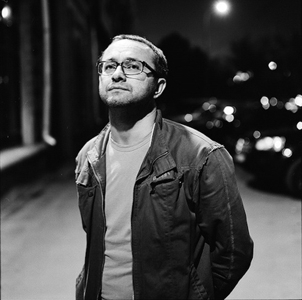Leviathan Is a Transfixing Epic That Grows On You
05/23/2014
Russian director Andrey Zvyagintsev has shown a penchant for studying desperate characters trapped in worlds much larger than anything under their control. From the two boys at the mercy of their demanding father in The Return, to the elderly working class woman in Elena driven to crime for the sake of her son's finances, Zvyagintsev has assailed Russian society from the inside out. But none of his preceding features reaches the heights of dark, probing inquiry on display in his beautifully layered epic Leviathan, a tragedy of biblical proportions in which fear and disillusionment are more central than the plot itself, and only the heartless people in power can find gratification.
In a rather surprising tonal shift from Zvyagintsev's earlier efforts, Leviathan is also a stingingly effective pitch-black comedy. While several of the main figures in this sprawling ensemble piece face the prospects of their lives falling apart around them, they're never too far away from another shot of vodka and rambling assessments of circumstances. But despite the occasional levity, Zvyagintsev never makes a joke of their situation, which is already looking pretty grim in the opening minutes.
That's where we find drunkard Kolia (Alexei Serebriakov), an auto-repairmen who lives in a remote town by the Barents sea in northern Russia with his soft-spoken wife Lilya (Elena Liadova) and adolescent son Roma (Serguei Pokhodaev). Kolia's life is thrust into turmoil when faced with plans by corrupt mayor Vadim (Roman Madyanov) to snatch away the poor man's land in order to build new developments. Kolia enlists the help of his old pal Dmitri (Vladimir Vdovitchenkov), a slick lawyer from the city who concocts a scheme for blackmailing the mayor into leaving Kolia alone. But Vadim and his henchmen have more power than any judicial process can possibly contain.
With these events in play, Zvyagintsev — who co-wrote the ever-expanding screenplay with Oleg Negin — steadily explores their fraught existence. Lilya's sense of alienation from her bumbling husband takes on a prominent role early on, and in short order she has turned to Dmitri for a clandestine affair that naturally only makes things worse.
This developments marks one of several occasions in which Zvyagintsev presents only hints of a situation as it unfolds, drawing out the perception that each of his protagonists is trapped by their own emotional frustrations. At times, Leviathan veers into coming-of-age territory by foregrounding the frustrations of young Roma as his family collapses around him, but the adults around him have too many of their own problems to help him out.
But even as these problems take on an increasingly tragic dimension, Zvyagintsev colors the situation with personality and unexpected humor. When the family goes on a shooting excursion by the water, guzzling booze as they gear up for another firing session, the occasion arrives at a cartoonish punchline when one member of their group decides to bring a machine gun. Moments later, a physical altercation brings the droll proceedings to a halt as Zvyagintsev's outlook comes out in one character's passing aside: "Man is the most dangerous animal." It's a point that inevitably sets up the Darwinian circumstances of the bleak final act.
Zvyagintsev credits Thomas Hobbes' 1651 tome of the same name for inspiring the movie's outlook on governmental control, but the filmmaker reaches for cosmic element in the tension between his angry, isolated subjects and the indifference of the system gradually crushing them. Primarily, though, Leviathan frames its downbeat events with a temperament steeped in cinematic expression. Bookending the drama with spectacular exterior images of his setting, he stages the conflict against an expansive landscape blanketed in the deep blues of water and sky. Emboldened by an unconventionally restrained Philip Glass score, the movie strikes a tone that's both spiritually poignant and ominous at the same time.
Rather than building towards the finality of a single climax, Leviathan injects several of them into the tapestry of its elegant design. A major criminal event takes place off-camera, and the fates of several people remain uncertain, but the movie never uses its vagaries as an excuse. Instead, Zvyagintsev conveys the frustrations of the mounting chaos through alluring visual symbolism. The movie offers no image more powerful than its youngest star curled up on a rock alongside the bones of a long-dead whale carcass, his sobs buried by the roar of the nearby waves.
But no matter how much sympathy Zvyagintsev may feel for the child, the movie ultimately allows chaos and immorality to win out. The jolting, mechanical destruction of a building in one closing scene is matched with a brilliant closing montage of religious fervor involving disreputable characters that puts an overwhelming cynical punctuation mark on everything leading up to it.
With its spiritual overtones, Zvyagintsev risks turning his dreary fable into an on-the-nose assessment of the situation, especially by including a scene in which the local preacher attempts to relate the family's dour circumstances to the Book of Job. But it's actually the man, not the movie, who falls short with this comparison. Rather than providing solace, he offers just one more reminder that none of these beleaguered locals can expect to control their fates. "All power comes from God", he asserts, but in Leviathan, that assumption is challenged when powerful men take stabs at playing the same role.
However, the movie's real villain isn't specific individuals but rather the cold processes that empowers them. "The world is constantly changing its reference points", one of them observes. In two crucial scenes, a courtroom decision is read so rapidly that it's impossible to keep up with the details, which eventually blur together into nothingness. Zvyagintsev finds a striking contrast to these moments with his final images, when only the stillness of nature can provide a semblance of peace.
Eric Kohn
"Indiewire"
